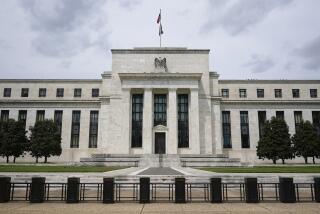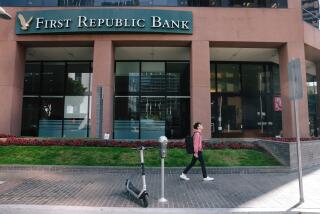3 Big Banks Plan Web Network to Ease Electronic Bill Payment
- Share via
NEW YORK — Three of the nation’s biggest banks are creating an online network that can deliver all of a consumer’s monthly bills to the Web site that handles his or her checking account.
Chase Manhattan, First Union and Wells Fargo hope the joint venture, announced Wednesday, will speed the shift from the costly process of printing and mailing bills, then waiting for a check to arrive and clear.
“We want to jump-start” electronic bill paying, said Ronald Braco, senior vice president of Chase and chairman of the new company’s steering committee. “We want to be able to get as many bills to our consumers as possible.”
The three banks also hope to position themselves at the center of a new market with huge profit potential.
Consumers can view many of their monthly bills on the Internet, but not through a single Web site operated by the bank or brokerage where they manage their money.
Instead, most need to visit each merchant’s Web site individually. Then, if they want to pay any of those bills online, they usually need to set up a credit card or checking account authorization at each site.
“The average American gets 12 to 17 bills a month. The likelihood that they would go to 12 to 17 places to get those bills is low,” said June Felix, a senior vice president at Chase.
Chase, First Union and Wells are not the first to try to tap the riches of consolidating that process under one roof. The two most prominent players are CheckFree Holdings, whose shares tumbled more than 20% after the announcement Wednesday, and TransPoint, a partnership between Microsoft Corp. and First Data Corp.
The new network, tentatively called the Exchange, is expected to be operating by the fall with Chase, First Union and Wells as the first three members.
Sun Microsystems will develop the technology for the network, which also will use software from credit card company Visa USA. No financial details of the joint venture were disclosed.
With a combined 60 million accounts serving consumers and small businesses, the three banks may have a strong head start in getting vendors such as phone companies and department stores to funnel their electronic bills through the new network.
Likewise, by signing up enough vendors, the partners hope to attract rival banks, brokerages and other financial institutions that want to offer customers one-stop billing at their Web sites.
That way, even if people do their banking elsewhere, the network would act as an electronic middleman, charging fees to carry online bills and payments between vendors and financial institutions.
Despite the advantage posed by their vast customer bases, Chase, First Union and Wells won’t necessarily monopolize the market for electronic billing and payment, said Michael Herd, spokesman for the National Automated Clearing House Assn., a nonprofit industry group.
Instead, a handful of dominant players might emerge, in much the same way that a few major networks operate the vast majority of ATMs, he said.
More to Read
Inside the business of entertainment
The Wide Shot brings you news, analysis and insights on everything from streaming wars to production — and what it all means for the future.
You may occasionally receive promotional content from the Los Angeles Times.










